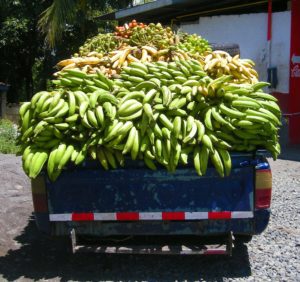Nationalism, Globalism, Bananas, Sports, and Cheese
Neither nationalism nor globalism are values. They are instead words that cast international relations and policies in different lights. A speech by the U.S. President can call U.S. based car companies Ford and General Motors national icons worthy of “Buy America” campaigns. Or the President can criticize foreign cars sold in the U.S. as unfair globalism or foreign nationalism (German companies Mercedes Benz, BMW, and VW, for example).
However, “Trump Attacks BMW and Mercedes, but Auto Industry Is a Complex Target,” (New York Times, January 16, 2017), notes many Mercedes, BMW, and VW cars sold in America are made in America by U.S. workers. And General Motors now sells more cars in China than in the U.S. Many GM and Fords sold in the U.S. are made in Canada or Mexico, and others with parts from factories in Canada and Mexico.
Auto makers, like other manufacturing firms and most tech firms have complex supply chains drawing parts from factories, laborers, and technical expertise distributed around the world. That may sound like “globalism” but it benefits both consumers and producers in the U.S. and other countries.

It would seem crazy to criticize Chiquita, Dole, or Del Monte for importing foreign “global” bananas from Guatemala, Ecuador, Costa Rica, and Honduras instead of growing “national” bananas in the U.S.. Banana trees grow better in tropical climates.
Americans on average consume nearly 35 pounds worth of orange juice and fresh oranges each year, but how many are grown and processed in the U.S.? Nearly all U.S. orange juice used to be grown in California (Orange County, for example) and Florida. Then as populations grew in Orange County and Florida, housing developments replaced orange groves. Lots of oranges and orange juice are still grown and processed in Florida, but much now is imported from Brazil (in giant orange-juice ships built like oil tankers! See more at “Fruit juice tankers,” (Marine Logistics, December 28, 2012) “There are at least eleven dedicated fruit juice tankers currently in operation.” And see “Carlos Fischer: The Fruit Juice Carrier,” Marine Insight, July 22,1016).
Critical of orange juice globalism is Robert P. Cummins in “My Orange Juice Came from Brazil,” (First Things, January 5, 2017). The author argues advances in shipping, logistics, and the Internet, reduce many of the economic advantages driving international trade.He argues higher taxes and regulations in the U.S. shift manufacturing, farming, and food processing advantages to other countries. Cummins also claims imports are pulling down U.S. wages, especially for those with less education and technical expertise. This claim is widely debated among economists and non-economists. (See, for example: “When and Why Nationalism Beats Globalism, (American Interest, July 10, 2016) “People Are Angry About Globalization. Here’s What to Do About It.”, Harvard Business Review, November 4, 2016, or “Economists Say ‘Economic Nationalism’ Is Economic Nonsense,” (Forbes, February 25, 2017, and “Is Globalization the Enemy of the People?” The Stream, August 8, 2016)).
Let’s turn to another global business: sports. Soccer, basketball, and other sports have global teams with top players from around the world. Every so often international competitions take place, but biggest being the World Cup and Olympics.
There can be a natural kind of nationalism, a sense of national pride in knowing successful companies as well as World Cup teams and Olympic winners are from your country. Samsung, LG, Kia make high-quality goods sold around the world and provide profits as well as employment for South Koreans. Honda, Toyota, Nissan and Subaru produce excellent automobiles popular around the world. All these companies are global and can provide a sense of national accomplishment for South Korea and Japan, countries devastated and impoverished by wars (the Korean War and World War II).
Nationalism is strong in South Korea, and tens of thousands rose in protest a decade ago at what may seem a strange issue: imported beef (“Riots Break Out In Seoul Over U.S. Beef,” July 1, 2008). It is still hard to import certain kinds of cheese from the U.S. to South Korea, even with a free-trade agreement. Are South Koreans cheese nationalists, or is there some other reason? Actually, South Korean cheese imports have risen dramatically over the last decade, and there are other reasons for restricting some kinds of U.S. cheese.
“Trade battle ferments over European cheeses,” (PBS NewsHour, March 11, 2014) explains:
As part of trade talks, the European Union wants to ban the use of European names like Parmesan, feta and Gorgonzola on cheese made in the United States.
The argument is that the American-made cheeses are shadows of the original European varieties and cut into sales and identity of the European cheeses. The Europeans say Parmesan should only come from Parma, Italy, not those familiar green cylinders that American companies sell. Feta should only be from Greece, even though feta isn’t a place. The EU argues it “is so closely connected to Greece as to be identified as an inherently Greek product.”
See also, “Europe’s War on American Cheese,” (Time, March 11, 2104). The E.U. also lobbies South Korean trade officials to block U.S. cheese imports that use European names. The battle over cheese nationalism and cheese globalism rages on…
